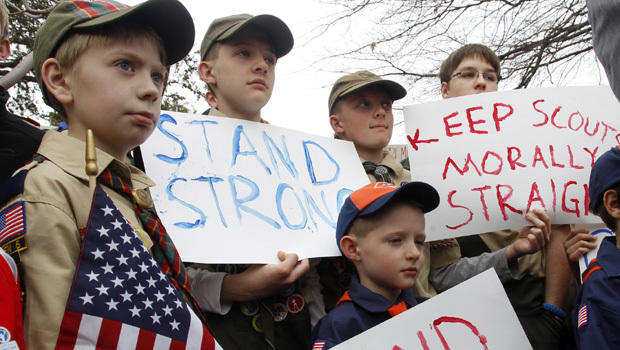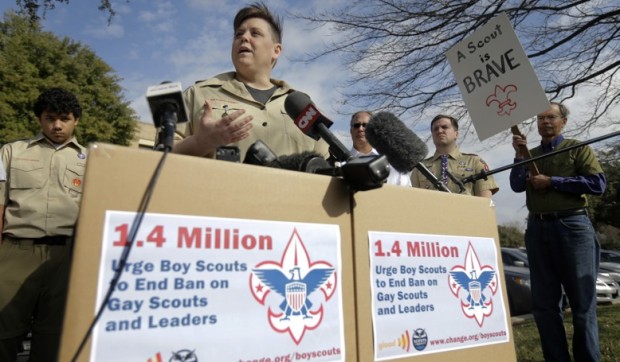|
The Boy Scouts is an American value-based youth organization that focuses on the development of boys into productive and responsible citizens by empowering them to be leaders in their communities. According to the Boy Scouts official mission statement, “[t]he mission of the Boy Scouts of America is to prepare young people to make ethical and moral choices over their lifetimes by instilling in them the values of the Scout Oath and Law.” Scout Law defines a Boy Scout as “trustworthy, loyal, helpful, friendly, courteous, kind, obedient, cheerful, thrifty, brave, clean, [and] reverent,” universal characteristics which encourage all boys to become “responsible, participating citizen[s] and leaders”. However, the Scout Oath discerning the values that the boys must swear allegiance to includes the declaration that they will keep themselves “physically strong, mentally awake, and morally straight.” The exact meaning of “morally straight” has recently come under scrutiny and debate across the nation. For example, this news video features Peter Sprigg, Senior Fellow on the Family Research Council, encouraging “the Boy Scouts to stand firm with the timeless principles they have always represented” and to specifically uphold “moral principles,” which means discouraging homosexuality: In January, the Boy Scouts of America met to vote on their policy that excludes membership to gays, lesbians, and transgendered individuals, but postponed the vote due to the “complexity of the issue”. While individual troops may choose to overlook the enforcement of this policy, the Boy Scouts handbook explicitly states that “[w]hile the BSA [Boy Scouts of America] does not proactively inquire about the sexual orientation of employees, volunteers, or members, we do not grant membership to individuals who are open or avowed homosexuals or who engage in behavior that would become a distraction to the mission of the BSA [emphasis added by author]” (BSA-discrimination.org).This erroneously argues that LGBT people distract boys from becoming “responsible, participating citizens and leaders” in a way that blatantly suggests openly gay members are not capable of participating as full, equal members of society. Arguing that openly gay members would stop boys from making morally sound decisions subordinates the masculinity of gay men by claiming that their reasoning and morality is defective in comparison to heterosexual men’s masculinity. Presumably, the primary reason for this is their deviance in preferred sexual partners. This second clip of popular right-wing Christian leader Pat Robertson attempts to cast doubt about homosexual men’s masculinity as immoral and conflated with pedophilia, which reasserts that the most normal and accepted form of masculinity as one that is exclusively heterosexual: Pat Robertson’s and Peter Sprigg’s claims exist as a part of public discourse on the issue even though the majority of the scientific community, including the American Psychological Association, have soundly disproven these claims. In light of this, similar organizations, such as the Girl Scouts of America, have subsequently altered their policies to be inclusive of LGBT members for a number of years. One way of analyzing the continued defense of this policy by the Boy Scouts is through the lens of Raewyn Connell’s theory of hegemonic masculinity. Connell (2005) describes hegemonic masculinity as “the pattern of practice (i.e., things done, not just a set of role expectations or an identity)” that establishes more than men’s dominance over women. Connell adds that hegemonic masculinity asserts other forms of masculinity as subordinate in relation to it and “embodie[s] the currently most honored way of being a man.” It “require[s] all other men to position themselves in relation to it.”
Through this lens, the Boy Scouts’ ardent defense of an anti-LGBT policy can be seen as an attempt to reaffirm a rigid gender binary with the most popular version of a right, moral or correct masculinity. Not only does it establish that real men are strong and brave, but also heterosexual. It subjugates men who are attracted to other men, and portrays them as ”immoral”. Accordingly, part of the power of hegemonic masculinity in shaping gender norms rests in the subordination of alternative masculinities. Therefore, dislodging this type of masculinity from being seen as more moral and acceptable than other marginalized masculinities, such as queer masculinities, is a necessary step for these men to gain equality and power to voice their concerns about issues in their community. As long as gay men are prevented from participating fully in mainstream organizations, especially those concerned with morality and ethics, issues disproportionately affecting their community, such as the endemic of HIV/AIDS, cannot be fully addressed.
Elizabeth Dickson Elizabeth Dickson is a student at Ohio Wesleyan University, where she is double-majoring in Psychology and Sociology.
John
4/14/2013 05:10:23 am
I have no problem with young gay scouts in my troop but I have a problem with gay scout Leaders who tend to molest innocent straight boy scouts at night, in restrooms and at camp.
Clare
4/26/2013 09:44:22 am
Weird I feel the same way about Catholic priests.
John
4/14/2013 05:14:48 am
I'm talking the Adult gay men, i don't trust them as leaders of young boys.
Clay
7/3/2013 05:01:56 am
Would you trust an adult straight man to lead young girls? Do you think that homosexuality and pedophilia are more closely connected than heterosexuality and pedophilia?
Bronn
6/5/2019 04:36:49 am
Most child abusers are heterosexual men. I was molested by one as a child. I don't trust heterosexual men. Comments are closed.
|
.
.
Tags
All
|


 RSS Feed
RSS Feed